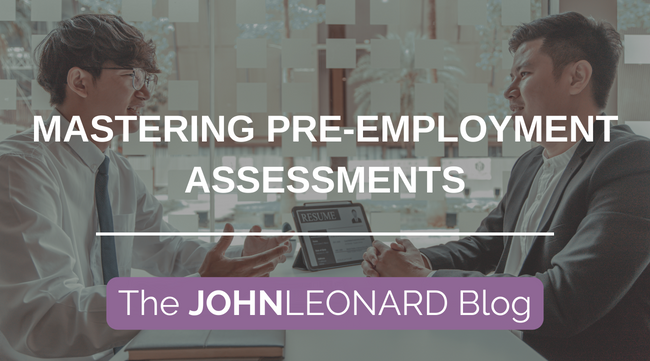In today’s competitive job market, pre-employment behavioral assessments are often involved in the hiring process. These are essential tools for employers to get to know the person standing before them better. Assessments gain insight into the candidate’s skills and behavior. In fact, “60% of candidates are required to take an assessment of some type during the hiring process,” according to Career Cloud. Being well-prepared is vital for increasing your chances of success, and landing your dream job is the ultimate goal.
The Purpose
Pre-employment assessments are commonly used by hiring managers to gain a better understanding of how a candidate might fit within their company, work with a certain team, or jive with a particular management style. More than three-quarters of companies use assessments in their hiring processes to help identify if the personality and traits of the candidate are suitable for their organization. These assessments range from cognitive to personality and judgment and are not typical pass-or-fail tests. They help employers match job seekers with the best-fitting roles.
Practice
Popular assessments, such as Caliper, Predictive Index, and Meyers-Briggs, provide insights into personality and characteristic traits: how you learn, your ability to complete tasks, and your workplace preferences. These assessments are beneficial to not only the hiring managers but the job seekers as well. Preparing for a pre-employment assessment is just as helpful as preparing for exams. Reviewing various formats, question styles, and taking online practice assessments will prepare you for what you will be presented with in the interview process and improve your chances for success in landing your dream job.
Honesty
Although it may be tempting to present yourself as a better candidate and provide the answers you think an employer wants, honesty is crucial. Employers want to avoid hearing common answers. They are looking for your personality traits, characteristics, and what makes you unique. These assessments give an immense amount of information compared to what is obtained in the traditional interview process. Remember, these assessments help determine workplace compatibility. The goal is to find the best fit, and dishonest responses defeat the purpose and waste valuable time.
Outcome
After the assessment, you could come across various outcomes and their implications. Getting the job is the ultimate goal. Receiving an offer indicates the employer thinks you are a qualified candidate for the position and wants you to join the team. You may receive an offer for a different role you were not anticipating but one better suited for your personality and work style. This means the employer believes you are a great fit for the organization, but better suited to an alternative role from the one you originally interviewed for. If you are not offered the position, understand that the position may not have been the right fit for you. Regardless of the outcome, asking for feedback can help you learn from the results of each test, demonstrating your dedication to learning and growing. While experience and skills matter in landing a job, these assessments are another valuable tool to determine a great match.
Pre-employment assessments are becoming more common in the hiring process. Keep an open mind and refrain from portraying yourself as something you’re not. The goal is to find the best candidate for the organization and ensure your skills, personality, and traits fit the desired position. By practicing and being honest, you will be prepared to find the best job for your career and lead you to the right path.
Looking for more ways you can succeed in your job search? Subscribe to The JOHNLEONARD Blog!


